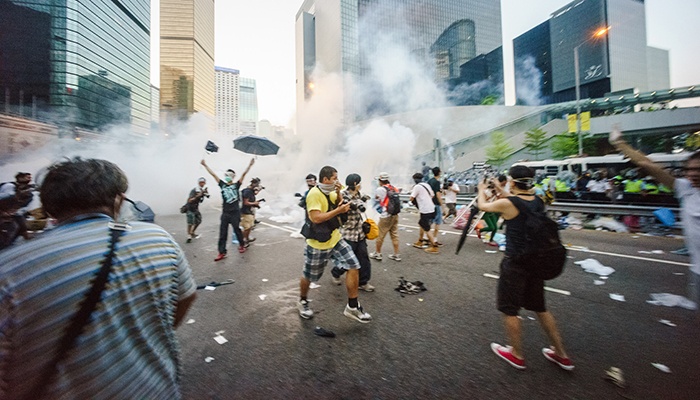One would think that China, with its one party-system, and India, with its parliamentary democracy, would deal with activism and criticism differently – yet lately, tales from both these countries point to the use of similar draconian measures to oppress student protestors.
For the larger part of last year, pro-democracy protests were held across Hong Kong. These protests were held against the mainland Chinese government that wanted to enact the Extradition Bill, which Hongkongers perceived to endanger their autonomy; having enjoyed more political and economic freedoms than the surrounding mainland regions since 1997, when it ceased to be a British colony and came under Chinese rule with the “one country, two systems” policy.
In 2019, the demonstrations actually led to the withdrawal of the controversial Extradition Bill; though protests continued after that as well, with Hong Kong people asserting their demands for independence from Beijing. But with the introduction of the National Security Act in June this year, what was most feared is happening – the Chinese government is encroaching and seeking greater control of the Hong Kong region.
Among many other people and groups, a pro-independence group called Studentlocalism had been fighting against the Chinese government since last year. The group’s former convenor, student activist Tony Chung was arrested on October 27th and charged with “secession”, along with two other charges, under the new National Security Act. Two other members of the group were also detained earlier, though they were released on bail. But Chung was denied bail, and will be detained until his court hearing in January. Chung had been trying to seek asylum with the US consulate before his arrest.
This is an example of a government clamping down on student protestors by painting them as a threat to the nation. Something very similar has been happening in the country immediately south to China. In India, the Modi-controlled BJP government has been cracking down on students who mobilised last year to protest against the Citizenship Amendment Act (CAA). These students, like Safoora Zargar, Umar Khalid and Meeran Haider, have been charged with the Unlawful Activities Prevention Act (UAPA). By doing this, the government is trying to convert those students’ anti-government stance into an anti-country stance – which is absolutely false. Criticism of the government is not criticism of a country. A country is larger than the government in power; but the BJP government is benefitting out of equating the two and scapegoating these students.
I wonder when peaceful protesting, considered a right under democratic India, became an “unlawful” activity. Many pro-government voices would argue that these protestors were not peaceful and resorted to violent means. But the report by Amnesty International suggests otherwise. Instead, it paints a picture of human rights violations committed by the New Dehli Police, which was found to be complicit in the violence that took place during the Northeast Dehli riots. A minister from the BJP government, Kapil Mishra has also made very provocative speeches before the violence on camera, and was in fact present in a gathering that shouted slogans such as “Desh ki gaddaron ko, goli maaro saalon ko”, which translates to “shoot the traitors” (referring to the anti-CAA protestors). However, no action has yet been taken against him, which points to the hypocrisy of the government’s enquiry into the protests and violence.
Even for the sake of the argument, if we are to go with the government’s narrative and assume that the students were the aggressors in this case, they are still not being given due process. In a country with a criminal system that is supposed to adopt an “innocent until proven guilty” principle, the treatment of these students as criminals without proof is unfair, and frankly shameful. They, like the students in Hong Kong, are being portrayed as a threat to the security of the nation and being labelled as “anti-nationals”.
In both the countries, the governments are very actively doubling down on students who have dared to criticise them. In both these places, there seems to be a tightening of the space available to express and question the ones in power. In these two tales, there is one common narrative of authoritarianism, a demand for blind compliance and punishment for daring to not comply to nationalistic politics.
Manasa Narayanan
Image source: Alex Leung

